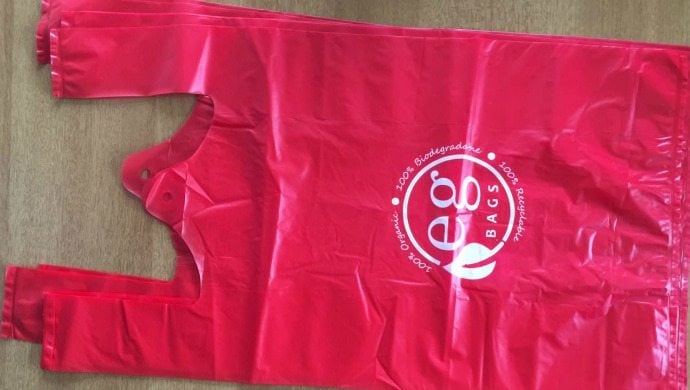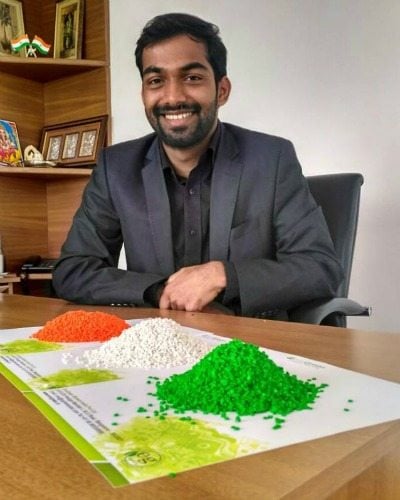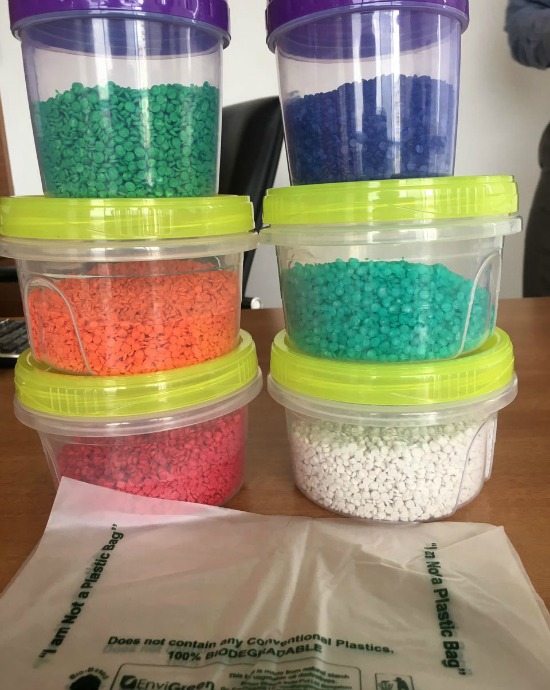Mangalore-based NRI entrepreneur Ashwath Hegde has come up with an eco-friendly alternative to plastic bags, which causes no harm even if you gulp it mistakenly

EnviGreen bag
I believe in creating a win-win situation. When I go to nearby grocery store, I always carry a non-plastic/clothing bag with me — so that the shopkeeper saves some money on the plastic bag that he gives me for free, and I prolong the lifespan of the planet I live on.
But not everyone follows this custom. Although the mankind has long realised its hazards of plastic and the harms it can cause to the environment, the use of plastic is on the rise across the globe.
Plastic is a double-edged sword, in a negative way: it pollutes the air when burnt, and makes the soil infertile when discarded, thus increasing the speed of global warming. No wonder many developed cities across the world have banned the use of plastic.

EnviGreen Founder Ashwath Hegde
However, there is still a glimmering of hope, as young innovators are coming up with alternatives to plastic materials. The future of our planet is in the hands of people like Rajagopalan Vasudevan, a Chemistry professor who has made 5,000km of road using plastic litter, and Abhishek Agarwal, a young entrepreneur who has found a way to convert sugar cane bagasse into bio-degradable cutlery.
Here is another young talent, who has come up with a biodegradable alternative to plastic bags. An affordable and eco-friendly material, this bag causes no harm even if one gulps it by mistake. Ashwath Hegde, a 25-year-old Mangalore-born Qatar-based NRI entrepreneur, is on a mission to get rid of plastic bags from the earth.
His startup EnviGreen makes eco-friendly bags using natural starch and vegetable oil derivatives — from potato, tapioca, corn, natural starch, banana, flower oil, etc. The good thing about the bag is that it does not contain any chemicals. “It is totally non-plastic,” Hegde tells e27. “Even the paint used for printing on the bags is natural and organic.”
Also Read: Attention! The road ahead of you is self-repairing
According to Hegde, its bag is non-toxic to the environment, animals and plants. Additionally, the bag has an electric dissipative feature, which is good for electronic wrapping. Also, it softens in normal water and dissolves in hot water.
Another salient feature is that when placing a hot iron on a small piece of EnviGreen film, it neither melts nor sticks to the hot iron surface. When a piece of EnviGreen film is burnt, it does not melt, drip, or release any toxic fumes.
Hegde claims that EnviGreen helps in lower fossil fuel consumption as conventional plastic bags are made from non-renewable, fossil-based oil. Conventional plastic has no economic value, which is why it is hardly recycled efficiently and is the major source of non-biodegradable waste.
As for pricing, while the EnviGreen bag is about 35 per cent costlier than that of a plastic bag, it is 500 per cent less than that of a cloth bag. Roughly, if a plastic bag costs you INR 2, the EnviGreen bag costs you just INR 3.
The startup currently imports raw materials from other countries. It now plans to source raw materials from farmers in rural Karnataka. “We have plans to distribute seeds so that farmers can produce the amount of materials,” he adds.

EnviGreen can produce 1,000 metric tonnes of bags every month. Hegde says that the EnviGreen is getting enquiries from large retailers like Reliance in India, and companies from abroad.
The EnviGreen bags are already available in Qatar and Abu Dhabi markets, but has not hit the Indian market yet. In India, the sales will begin from January next year, Hegde says.
EnviGreen also has an office in Doha in Qatar, and plans to open more offices as the company grows. EnviGreen currently employs nearly 60 people across its two offices.
Hegde says: “When we do not properly dispose of our waste, we give rise to severe risks. Improper disposal methods like incorrect dumping locations or the burning of waste is a major contributor to air pollution. Currently in the world, one in every eight deaths can be directly linked to air pollution, which is only aggravated by our improper disposal habits.”
“As EnviGreen products are all made from natural, biodegradable materials, it is perfectly safe for any living beings to consume it. Finally, a product that will not leak toxic chemicals when breaking down in the stomach of animals when consumed,” he said in the post
Plastic touches almost every part of our lives. No doubt, it is a menace to the planet. According to a Telegraph article of last year, plastic is an iconic symbol of waste — it is bad for wildlife, costly to clear up, uses finite natural resources, and take years to decompose. Unless and until we find an affordable and eco-friendly alternatives to plastic, our plant doesn’t stand a chance in the long run.
Hopefully, people like Hegde can make a difference.
—
Image Credit: EnviGreen
The post This shopping bag is made of natural starch and vegetable oil derivatives appeared first on e27.